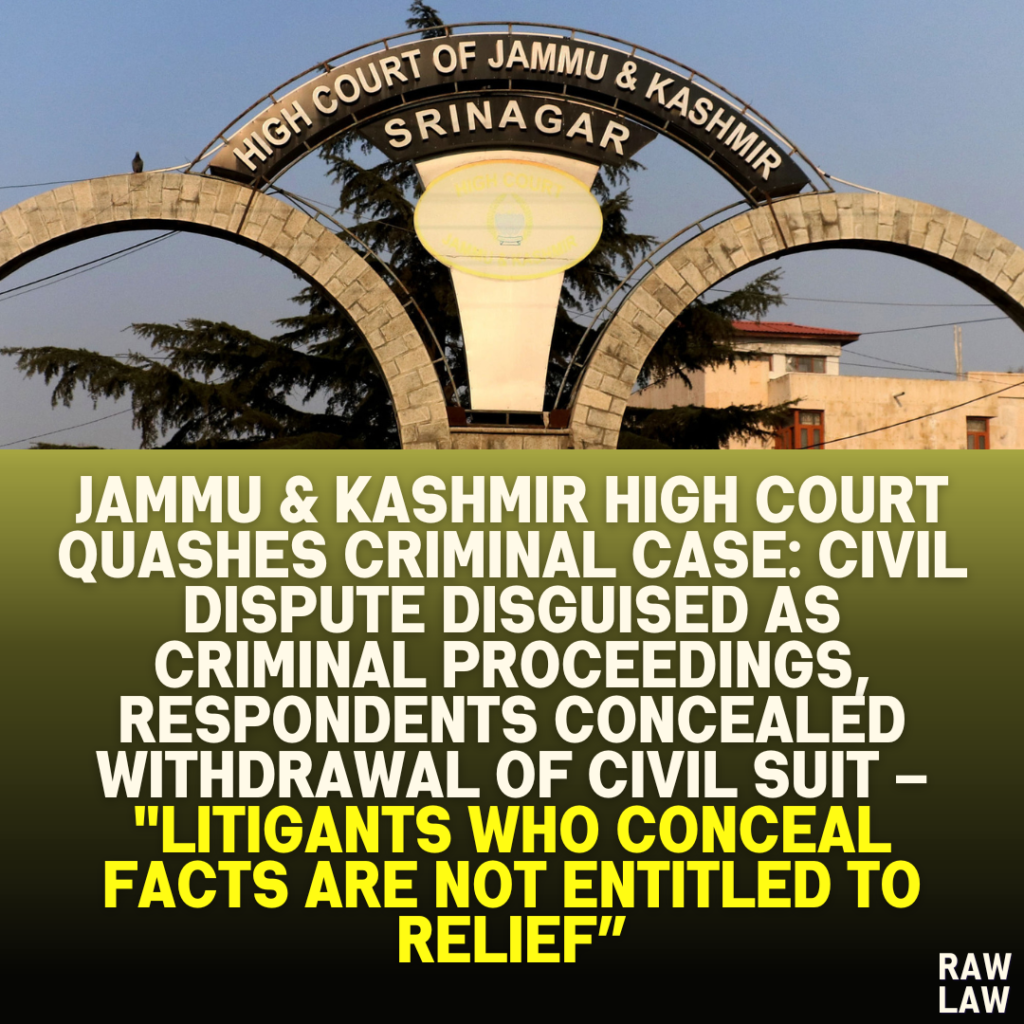Court’s Decision:
The High Court of Jammu & Kashmir and Ladakh quashed the proceedings against the petitioner that were pending before the Chief Judicial Magistrate, Kargil. The court held that the complaint was an abuse of process and initiated solely to settle a civil dispute under the guise of criminal proceedings.
Facts:
The respondents had filed a civil suit in 2019, claiming that they had entered into a partnership with the petitioner for the execution of a contract to lay Optical Fiber Cable. They alleged that the petitioner retained all the profits without sharing them with the respondents. The civil suit was withdrawn in 2021, after which the respondents filed a criminal complaint alleging cheating and breach of trust under Sections 420 and 409 of the IPC.
Issues:
The primary issue was whether the criminal proceedings initiated by the respondents constituted an abuse of process to resolve a civil dispute.
Petitioner’s Arguments:
The petitioner contended that the dispute was essentially civil in nature, and the criminal process was being misused to exert pressure. It was also argued that the respondents had concealed material facts regarding the prior civil suit, which dealt with the same issue of profit-sharing from the partnership.
Respondent’s Arguments:
The respondents maintained that the petitioner had acted dishonestly by not sharing the profits of the contract, which constituted criminal offenses under Sections 420 and 409 of the IPC. They argued that civil and criminal proceedings could run concurrently.
Analysis of the Law:
The court examined whether the dispute, primarily civil in nature, was given a criminal flavor. Relying on precedents, the court emphasized that criminal law cannot be invoked merely to settle civil disputes, especially when civil remedies are available and pursued.
Precedent Analysis:
The court referred to judgments, including Naresh Kumar v. The State of Karnataka, which held that civil disputes cannot be converted into criminal cases to exert undue pressure. The court also relied on Dalip Singh v. State of U.P., where it was held that a litigant who conceals material facts is not entitled to any relief.
Court’s Reasoning:
The court found that the respondents, after withdrawing their civil suit, resorted to criminal proceedings to harass the petitioner. The criminal process was abused to settle the civil dispute regarding the profits from the partnership, which should have been resolved through civil litigation. The respondents’ failure to disclose the withdrawal of their civil suit before filing the criminal complaint further demonstrated bad faith.
Conclusion:
The High Court quashed the criminal proceedings, finding them to be an abuse of the legal process. The court concluded that the dispute was civil in nature and that criminal proceedings were inappropriately used to settle it.
Implications:
This judgment reinforces the principle that civil disputes should not be settled through the criminal justice system. It serves as a reminder that litigants must not misuse the criminal process to exert pressure in civil matters.




Pingback: Gauhati High Court Upholds Murder Conviction: Accused Provoked by Child's Teasing, But Attack Deemed Excessive and Cruel, Not Covered Under Exception 4 of Section 300 IPC - Raw Law
Pingback: Uttarakhand High Court Allows Proprietorship Firm to Seek Revocation of GST Registration Cancellation Due to Non-Filing of GST Returns for Six Months, Affirms Right to Make Payment of Outstanding Dues - Raw Law
Pingback: Delhi High Court Quashes Adverse Remarks of CRPF Deputy Inspector General: Advisory Beyond Assessment Period Cannot Justify Downgrading - Raw Law